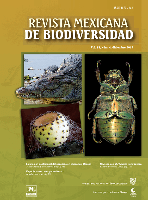
Revista Mexicana de Biodiversidad
Scope & Guideline
Pioneering Research for a Greener Tomorrow
Introduction
Aims and Scopes
- Biodiversity Assessment and Taxonomy:
The journal publishes extensive research on the identification and classification of species across various taxa, including plants, animals, fungi, and microorganisms. This includes descriptions of new species, taxonomic revisions, and biodiversity assessments in different ecosystems. - Ecological and Environmental Studies:
Research articles often focus on ecological interactions, habitat assessments, and environmental impacts on biodiversity. This includes studies on species distribution, community structure, and the effects of human activities such as land use change and climate change. - Conservation Strategies and Management:
The journal contributes to the field of conservation biology by publishing studies that evaluate conservation practices, propose management strategies, and assess the effectiveness of protected areas for biodiversity preservation. - Functional Ecology and Ecosystem Services:
Research on the ecological roles of species and their contributions to ecosystem services is a major focus. This includes studies on food webs, trophic interactions, and the role of biodiversity in ecosystem resilience. - Microbial and Fungal Diversity:
The journal highlights the significance of microbial and fungal diversity, including studies on their ecological roles, biotechnological applications, and contributions to ecosystem health.
Trending and Emerging
- Climate Change Impact Studies:
Research examining the effects of climate change on biodiversity is on the rise, with a focus on species distribution modeling and ecosystem responses to climatic shifts. This trend highlights the urgency of understanding how climate change affects biodiversity and informs conservation strategies. - Urban Ecology and Biodiversity:
There is a growing interest in urban ecology, particularly studies assessing biodiversity in urban settings and the impact of human activity on wildlife. This reflects an increasing recognition of urban areas as critical habitats for many species. - Conservation Genetics and Genomics:
Emerging studies in conservation genetics and genomics are becoming more frequent, as researchers utilize genetic tools to understand population dynamics, genetic diversity, and the evolutionary implications of conservation strategies. - Microbial Ecology and Fungus Research:
Research focusing on microbial and fungal diversity, including their ecological roles and potential applications in biotechnology, is gaining attention. This trend underscores the importance of these organisms in ecosystem functioning and health. - Invasive Species and Management Strategies:
Articles addressing the challenges posed by invasive species and strategies for their management are increasingly common, reflecting a growing concern over their impacts on native biodiversity and ecosystem integrity.
Declining or Waning
- Historical Biogeography Studies:
Research focusing on historical biogeography appears to be waning, with fewer studies published that explore the historical distribution and evolutionary history of species in the region. This may indicate a shift towards more contemporary ecological issues and conservation. - Traditional Ethnobotanical Studies:
While ethnobotanical research remains important, there seems to be a decline in studies specifically documenting traditional uses of plants and their cultural significance, possibly overshadowed by more empirical ecological and conservation-focused research. - Generalized Species Distribution Models:
There has been a noticeable decrease in generalized species distribution modeling studies, which may be transitioning to more complex models that incorporate climate change and ecological interactions, reflecting a shift towards more integrative approaches.
Similar Journals
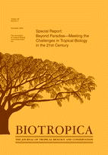
BIOTROPICA
Exploring the dynamics of ecosystems and their conservation.BIOTROPICA is a premier journal published by Wiley, specializing in the fields of Ecology, Evolution, Behavior, and Systematics. With a robust impact factor and positioned in the Q1 category in its field, it stands out as a leading source of research that informs and shapes our understanding of biodiversity and ecosystem management. Since its inception in 1979, BIOTROPICA has been dedicated to publishing high-quality articles that advance scientific knowledge and foster conservation efforts globally. Researchers and professionals alike value the journal for its rigorous peer-review process and its influence in academic discourse, demonstrated by its Scopus ranking placing it in the 70th percentile among its peers. While the journal does not currently offer open access, it continues to be a vital resource for those engaged in the study of biological systems, making significant contributions to the advancement of ecological science. Readers can expect to find a wealth of innovative research and perspectives that are critical to addressing contemporary environmental challenges.

FOLIA GEOBOTANICA
Bridging the gap between ancient ecosystems and modern plant science.FOLIA GEOBOTANICA, published by Springer, is a distinguished journal dedicated to advancing the fields of Paleontology and Plant Science through the dissemination of high-quality research. With an ISSN of 1211-9520 and an E-ISSN of 1874-9348, this journal has been pivotal in providing a platform for innovative studies from 1994 to 2024. Notably, FOLIA GEOBOTANICA holds a Q3 ranking in Paleontology and a Q2 ranking in Plant Science as of 2023, affirming its relevance and contribution to the scholarly community. The journal is located in the Netherlands at VAN GODEWIJCKSTRAAT 30, 3311 GZ DORDRECHT, and is not an Open Access publication, ensuring comprehensive review processes and scholarly integrity. With Scopus rankings that place it in the 50th percentile for Plant Science and 46th for Paleontology, FOLIA GEOBOTANICA continues to attract researchers, professionals, and students who are keen to explore the intricacies of plant ecology and fossil records, thereby fostering a deeper understanding of ecological and evolutionary patterns.
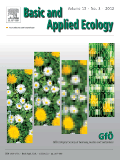
BASIC AND APPLIED ECOLOGY
Advancing ecological understanding for a sustainable future.BASIC AND APPLIED ECOLOGY, published by Elsevier GmbH in Germany, stands out as a premier journal in the field of ecology, evolution, behavior, and systematics. With its ISSN 1439-1791 and E-ISSN 1618-0089, the journal enjoys a distinguished reputation, evidenced by its classification in the Q1 category for Ecology in 2023 and impressively ranking #89 out of 721 in this domain according to Scopus. Since its inception in 2000, it has served as a vital platform for disseminating high-quality research that bridges theoretical insights and practical applications in ecology. Researchers, professionals, and students alike can look forward to the latest findings that not only foster a deeper understanding of ecological processes but also inform sustainable practices crucial for our environment. As the journal continues its journey through to 2024, it remains committed to advancing ecological knowledge and supporting innovative research in an ever-evolving field.

Global Ecology and Conservation
Championing innovative solutions for environmental challenges.Global Ecology and Conservation, published by Elsevier, stands as a premier open-access journal dedicated to advancing the field of ecology and conservation science. Since its inception in 2014, the journal has facilitated the dissemination of high-quality research, fostering critical dialogue on ecosystem management, biodiversity preservation, and sustainability practices across the globe. With a remarkable ranking within the top quartiles (Q1) in various categories including Ecology, Evolution, Behavior and Systematics, and Nature and Landscape Conservation, it is positioned among the leading resources for researchers and professionals alike. The journal has garnered a notable impact, ranking #65 out of 721 in Ecology, and houses articles that are vital to understanding and addressing the pressing environmental challenges of our time. Available in an open-access format, researchers can freely access and share vital findings, promoting a collaborative approach to ecological research. Global Ecology and Conservation is not just a publication; it is a critical tool for innovation and advocacy in conservation, poised to inspire the next generation of environmental stewards.

Ecosistemas
Advancing ecological understanding for a sustainable future.Ecosistemas is a prominent Open Access journal published by the ASOCIACION ESPANOLA ECOLOGIA TERRESTRE, specializing in the field of ecology. Since its inception in 2001, it has dedicated itself to advancing ecological knowledge and research, fostering an inclusive platform for the dissemination of cutting-edge studies that span ecological interactions, sustainability, and biodiversity. The journal, based in Spain, has established its reputation with notable rankings such as Q3 in the field of Ecology and Q4 in Ecology, Evolution, Behavior, and Systematics, reflecting its commitment to quality research. With a Scopus Ranks position placing it in the 40th and 37th percentiles for its categories, Ecosistemas is integral to the academic community, serving researchers, professionals, and students alike. It provides a vital resource for those seeking to understand ecological dynamics and environmental challenges, facilitating open access to important findings and discussions that shape the future of our ecosystems.
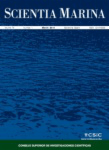
SCIENTIA MARINA
Connecting Scholars to the Wonders of the SeaSCIENTIA MARINA, an esteemed journal published by the Consejo Superior Investigaciones Cientificas (CSIC) in Spain, focuses on critical studies within the fields of Aquatic Science and Oceanography. With an Open Access policy since its inception in 1998, this journal facilitates widespread dissemination of research findings, significantly enhancing accessibility for researchers, professionals, and students alike. Currently, SCIENTIA MARINA holds a Q3 ranking in both categories for 2023, demonstrating its commitment to advancing knowledge in marine and aquatic environments. With a convergence of research years from 1996 to 2024, it remains a pivotal platform for innovative research, encompassing various aspects of marine biology, ecology, and environmental science. The journal serves as an essential resource for scholars aiming to contribute to the understanding and preservation of marine ecosystems.

BIOTA NEOTROPICA
Unlocking the Secrets of Neotropical BiodiversityBIOTA NEOTROPICA is a prominent open access journal dedicated to advancing knowledge in the interdisciplinary field of ecology, evolution, behavior, and systematics. Published by REVISTA BIOTA NEOTROPICA since 2001, this Brazilian journal aims to provide a platform for high-quality research that fosters a deeper understanding of Neotropical biodiversity and its conservation. With an ISSN of 1676-0603 and an E-ISSN of 1676-0611, the journal has established its reputation within academic circles, ranking in the Q3 quartile for Ecology and achieving a respectable percentile of 57 in Scopus’s metrics. Operating from its headquarters in Campinas, SP, Brazil, BIOTA NEOTROPICA not only focuses on research dissemination but also encourages collaboration and exchange of ideas among scientists, students, and professionals in the field. The journal is particularly valuable for those looking to contribute to the understanding of ecological systems and promotes accessibility with its open access model.

ACTA OECOLOGICA-INTERNATIONAL JOURNAL OF ECOLOGY
Exploring the Frontiers of Ecological KnowledgeACTA OECOLOGICA-INTERNATIONAL JOURNAL OF ECOLOGY, published by Elsevier, stands as a prominent platform for disseminating innovative research in the diverse field of ecology. Operating since 1983 and continuing to make significant contributions into 2024, this journal features critical studies that advance our understanding of ecological systems, behaviors, and conservation efforts. With an impressive Q2 ranking in both the ecology and nature conservation categories, it exemplifies high-quality scholarship, reflected in its Scopus rankings—#74 in Environmental Science and #254 in Agricultural and Biological Sciences. Researchers, professionals, and students in the field are invited to explore the latest findings and methodologies that address pivotal ecological issues. As a journal committed to fostering academic collaboration, ACTA OECOLOGICA is essential for anyone dedicated to enhancing their comprehension of ecological dynamics and advancing sustainability practices globally.

Diversity-Basel
Championing open dialogue in the pursuit of ecological understanding.Diversity-Basel is a premier open-access journal published by MDPI, specializing in the vital fields of agricultural, biological, and ecological sciences. Launched in 2009, this multidisciplinary journal, operating from Switzerland, aims to disseminate high-quality research that advances the understanding of biodiversity and ecosystem dynamics. With an impressive impact factor and notable rankings in Scopus, including Q1 classification in Agricultural and Biological Sciences and strong positions in Ecology and Ecological Modeling, Diversity-Basel stands as a valuable resource for global researchers, professionals, and students alike. Its commitment to accessibility enables researchers to reach a wider audience, fostering collaboration and innovation in addressing pressing environmental challenges. By providing an inclusive platform for diverse scientific inquiries and innovations, Diversity-Basel plays an essential role in shaping the discourse on biodiversity conservation and management, encouraging the pursuit of sustainable solutions in our rapidly changing world.
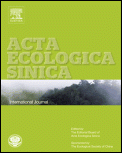
Acta Ecologica Sinica
Exploring the depths of ecological science for global impact.Acta Ecologica Sinica, published by Elsevier, is a prominent journal in the field of ecology, with a strong focus on fostering understanding in ecological principles and their applications. Established in China, this journal holds an impressive Q2 categorization in both Ecology and Ecology, Evolution, Behavior and Systematics as of 2023, positioning it within the top tier of ecological research. With its Scopus rankings placing it in the 81st and 78th percentiles in relevant ecological domains, it serves as a vital platform for researchers and practitioners to disseminate findings that promote ecological sustainability. Although it operates under a traditional access model, its significant impact is underscored by its systematic convergence of key ecological inquiries across multiple years (2006-2008, 2014, 2017-2023). By engaging with the latest empirical studies, theoretical advancements, and methodological innovations, Acta Ecologica Sinica is indispensable for scholars dedicated to advancing ecological knowledge and addressing environmental challenges.